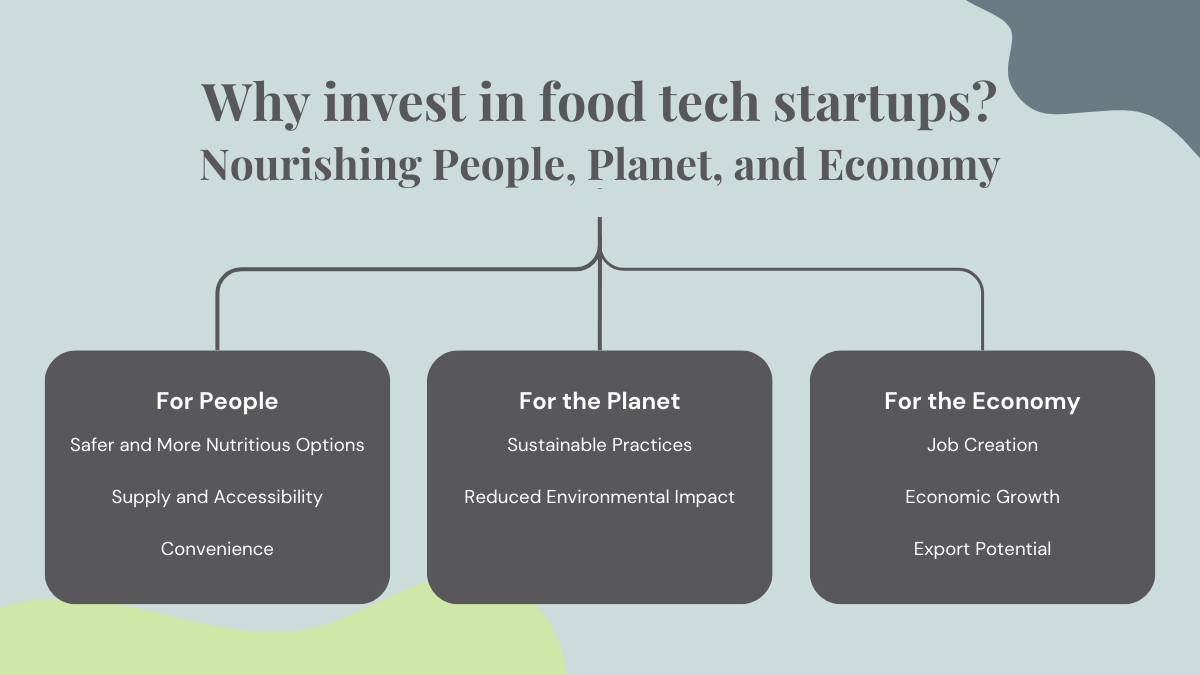Why Invest in Food Tech Startups? Nourishing People, Planet, and Economy
The increasing demand for nutrition to support a constantly growing and evolving global population—along with the push for more sustainable and healthier food systems—creates endless opportunities to fund innovative ventures in a multi-trillion-dollar market. As we become more mindful of the effects of food on our well-being and the planet, this shift drives transformation across the board in the food technology industry.
Investing in food tech startups not only affects the production, processing, preservation, packaging, and distribution of food products, but it’s a game-changer for nourishing people, the planet, and the economy.
Here’s why investing in food tech startups is a smart decision with far-reaching benefits that hold promise for creating a healthier, more prosperous future for everyone.
Fueling People
Healthier Food Options and Enhanced Accessibility
One of the primary benefits of investing in food tech startups is its effects on society and the potential to promote healthier food options and improve access to our required nutrients. In a world where diet-related diseases are on the rise, these startups leverage technology to revolutionize the way we eat, from enhancing food safety to nutrition to availability and convenience to quality and everything in between:
Safer and More Nutritious Options: Food technology ensures food safety, enhances nutritional value, and combats malnutrition through fortification and enrichment. Complying with regulations, food tech startups often focus on creating healthier and more nourishing food alternatives. This can lead to improved dietary habits and better overall health outcomes for consumers.
Supply and Accessibility: Considering food is a basic life necessity, many food tech startups work to increase supply and reduce food waste. Some innovations aim to make nutritious food more accessible to a broader population, including those in underserved communities or regions with limited access to fresh produce.
Convenience: Food tech companies often develop products and services that enhance convenience, such as meal delivery services, meal kits, and on-the-go snacks, making it easier for people to access and consume nutritious food even with busy lifestyles.
Take, for example, RxFood Corp: a Canadian-based artificial intelligence (AI)-powered platform that analyzes photos of meals captured by users over three days. The system assesses food content and portion sizes and calculates validated diet quality scores—providing evidenced-based, medical-grade nutrition assessments through the use of AI and image recognition technology
Sustaining Our Planet
Technologies for Environmental Conservation
Beyond nourishing people, investing in food tech startups also offers significant benefits for the health of our planet and future generations. With growing concerns about environmental sustainability and the impact of food production on ecosystems, these startups are pioneering new approaches to food production and consumption:
Sustainable Practices: Seeing as about one-third of the world’s greenhouse gas emissions (GHG) is linked to food, agriculture uses half of the world’s habitable land, and food production requires large amounts of fresh water, finding sustainable solutions has become increasingly important. To help mitigate environmental degradation, reduce GHG emissions, and conserve natural resources, many food tech startups prioritize sustainability by developing alternative protein sources, reducing food waste, and adopting eco-friendly farming practices.
Reduced Environmental Impact: Innovations in food production methods, such as vertical farming, lab-grown meat, and precision agriculture, can significantly reduce the environmental footprint of food production compared to traditional farming methods.
For example, food waste is a major contributor to environmental degradation, accounting for a significant portion of GHG emissions worldwide (if food waste were a country, it would be the third-largest emitting country in the world). Food tech startups are tackling this issue by developing technologies and platforms to reduce food waste throughout the supply chain, helping to minimize waste and maximize the efficiency of our food systems.
Stimulating Economic Growth
Job Creation and Innovation
Investing in food tech startups not only benefits people and the planet but also stimulates economic growth and innovation. Even zooming into just one section, agriculture and food is one of the biggest industrial sectors globally (USD $86 trillion GDP). Startups in the food tech space are driving job creation, fostering entrepreneurship, and contributing to economic development in communities around the world:
Job Creation: Food tech startups create employment opportunities across various sectors, including research and development, manufacturing, distribution, and marketing. As these companies grow, they often hire skilled and specialized workers and contribute to job creation in their respective regions.
Economic Growth: The global food technology market size was estimated to reach USD $172.66 billion in 2022 and is expected to grow at a compound annual growth rate (CAGR) of 9.9% from 2023 to 2030.
With the introduction of novel products, processes, and technologies, food tech startups enhance productivity and profitability within the food industry, attracting investment and fostering entrepreneurship. Successful food tech startups have the potential to disrupt traditional food industries, creating new market opportunities and driving economic expansion. By adding value through existing and new products and promoting resource efficiency, these startups bolster overall economic activity and dynamism while contributing to the long-term resilience of the food supply chain.
Export Potential: It’s clear that food tech startups have significant export potential thanks to innovative products, alignment with global trends like health and sustainability, ability to cater to diverse culinary preferences, leverage of technology, and access to international markets through e-commerce, government support, and brand recognition. Despite challenges such as regulatory differences and local competition, strategic planning and market research can enable these startups to tap into international markets and expand their reach globally.
Food technology addresses a basic human need, and the sector is poised to address major global challenges. By improving access to sufficient nutrition for a growing population, cutting the industry's share of greenhouse gas emissions, and contributing to global economic growth, food tech startups and investors are in a good spot for expansion and profitability while paving the way for a more nourished, sustainable, and prosperous future for generations to come.
As investors, entrepreneurs, and consumers, we have the power to support and champion these innovative companies, driving positive change and making a meaningful impact on our world.
About Our Partnership with Small Scale Food Processor Association (SSFPA)
Aligning the intention of impact investing to our mission of affording people of underrepresented genders opportunities to learn about and activate their investing and entrepreneurship potential, we’re thrilled to partner with the Small Scale Food Processor Association (SSFPA) on their Venture-Capital Ready: Investment Training for Women Entrepreneurs program.
Venture-Capital Ready is aimed at food industry women/intersectional entrepreneurs ready to present themselves and their business for investment and scale up to meet market demand.
Within the two-year program, M51 is facilitating a four-module investor curriculum to guide participants through the fundamentals of early-stage investing with a focus on impact investing and the Canadian food and agriculture sector.
Keep an eye out on our blog and social media to follow along with the modules and as we share more resources around impact investing, food and agriculture, and building the world we want to live in—today and for future generations.



